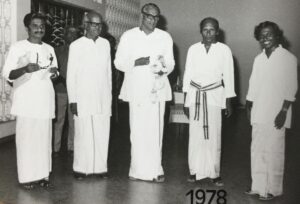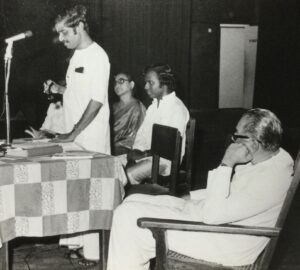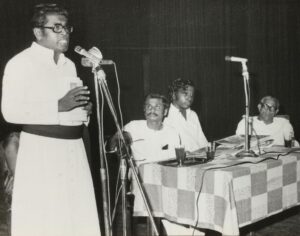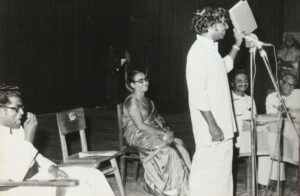Part 1
by Sachi Sri Kantha, June 14, 2024
I was saddened to hear the death of M.K. Eelaventhan, at the age of 91 on April 28, 2024 in Canada. Born on Sept 14, 1932, he was 20 years older than me. I became acquainted with him in 1976 (see below, my diary entries, from 1975 to 1981). In this two part appreciation, I record my impressions about him, and his influence on my writing career. Eelaventhan gladly accepted my invitation to preside my Tamil book release function on August 18, 1978, held in Colombo. Four photos taken on this occasion, I provide nearby. My last face to face meeting with him was in December 2007 in Tokyo. He spent a few days with me. About this interaction, I’ll write in part 2.

From Lt to Rt – Eelaventhan, M. Kanapathipillai, M. Sivasithamparam, Sachi’s father and Sachi (Aug 18, 1978)
My 2000 Commentary on deportation of Eelaventhan from India
In December 2000, after Eelaventhan was forcefully deported from Chennai to Colombo against his wishes, I wrote a commentary about this issue. It was titled ‘M.K. Eelaventhan – a Man with a Mission’. It was posted in the now defunct Tamil Nation website of Mr N. Satyendra. [https://tamilnation.org/forum/sachisrikantha/eelaventhan]. This was before, I became a regular contributor to the Sangam site. I reproduce this commentary below, with marginal revision:
“ When it comes to painting the peculiarities of the minds of Indian Poo-Bahs, none can do better than R.K. Narayan. In one of his essays entitled, ‘When India was a Colony’, written to the New York Times magazine, Narayan reminisced as follows:
‘I had a close relative in the I.C.S. [Indian Civil Service] who could not be seen or spoken to even by members of his family living under the same roof, except by appointment….
The I.C.S. manual was his Bible that warned him against being too familiar with anyone. He was advised how many mangoes he could accept out of a basket that a favor-seeker proffered; how far away he should hold himself when a garland was brought to be slipped over his neck. It was a matter of propriety for an average visitor to leave his vehicle at the gate and walk down the drive; only men of certain status could come in their cars and alight at the portico…it dehumanized the man, especially during the national struggle for independence. These men proved ruthless in dealing with agitators, and may well be said to have out-Heroded Herod. Under such circumstances, they were viewed as a monstrous creation of the British. An elder statesman once defined the I.C.S. as being neither Indian nor civil nor service…
The British managed to create a solid core of Anglophiles who were so brainwashed that they would harangue and argue that India would be in chaos if the British left, and called Mahatma Gandhi a demagogue and mischief maker and would congratulate Churchill on calling Mahatma Gandhi ‘half naked fakir’…(A Writer’s Nightmare – Selected Essays, 1958-1988, Penguin Books, 1988, pp. 222-232).’
Well, Gandhi and Churchill have passed into eternity. But the I.C.S. mentality portrayed by Narayan still lingers on in the successors who followed the steps of Narayan’s I.C.S. relative. This is how I reconciled myself to the recent news of M.K. Eelaventhan’s deportation from India.

Aug 18, 1978 – Eelaventhan speaking. Seated from Lt to Rt – Brother Selvaratnam (face hidden), Mrs P Wijeratnam, Sachi and M. Sivasithamparam
Eelaventhan became a recognizable personality for me around 1963, when I was a 10 year old kid at the Colombo Hindu College. Since then, until mid-1970s, he was a familiar face for me and to other Tamil school children and university undergrads in Colombo, since he frequently delivered lectures and actively participated in the Saraswati Poosai celebrations and annual art and dance programs held in school premises and in public halls like Saraswathi Hall, Saiva Mangaiyar Kazhagam Hall, Ramakrishna Hall,Vivekananda Hall and New Kathiresan Hall.
What impressed me most about him was his dimunitive physical stature, penetrating and enthusiastic eyes, infective smile and quick strides. He was always a man in a hurry, like Mahatma Gandhi. Even in the 1960s, long before the Eelam campaign began in earnest, he became an active one-man propagandist for Eelam – by adopting the name ‘Eelaventhan’ (King of Eelam), by which he became well known to Tamils.
Like a sponge, by watching his activities, I also imbibed his passion for Tamil culture and his bi-lingual (Tamil and English) talent in expressing his views to an audience – even to those who disagreed with him stridently. He could quote extemporaneously verses from Saint Manickavasagar and speeches from Mahatma Gandhi, Jawaharlal Nehru, Muhamad Ali Jinnah, Sarvepalli Radakrishnam, S.J. V. Chelvanayakam and S.W.R.D. Bandaranaike to buttress his point.
A couple of his oft-quoted proverbs/idioms still ring in my ear. He used to say, ‘Aar kutthinaalum arisiyaanaal sari’ [Whoever pounds, what we need is the rice], and ‘Engallukku silusiluppu vendaam, palahaaram thaan thevai’ [What we need is the sweets and not the rattling noise].
In the mid-1970s (between 1975 and 1979), I was in close orbit with Eelaventhan in Colombo. While serving as the President of the Colombo branch of TULF, Eelaventhan canvassed actively among the Tamils and non-Tamils for the cause of Eelam liberation. I was one of the nearly 30-odd regulars to the weekly discussion sessions he organized and conducted at a location near Bambalapitiya (Colombo 4) junction. He held court at the front porch of a house belonging to the businessman S. Thirunavukarasu (who became the MP for Vaddukoddai in 1977). For his weekly sessions, Eelaventhan invited a number of public figures regularly to exchange information and convey the idea of Tamil youth. Some of these personalities whom I listened to in these meetings include, the noted journalist Mervyn de Silva (editor of Lanka Guardian), Dr. Neelan Tiruchelvam and Muslim leader M. Ashraff (who was then a neophyte to the Sri Lankan politics). Because of his propaganda activities related to Eelam campaign, Eelaventhan became a marked person in Colombo, and suffered during the 1977 ethnic riots. He was physically assaulted and his valuable collection of Tamiliana literature kept in Nugegoda was destroyed by the Sinhala thugs. It pained us (those lucky ones who narrowly escaped from such savagery) much to see Eelaventhan suffering like Gandhi at the hands of arrogant, unruly elements. But, the Gandhian ‘never-give-up’ spirit in him gave Eelaventhan the strength to continue his mission.
In August 1978, an year after the 1977 ethnic riots, when I organized a cultural event to celebrate the release of my first Tamil book, Thamil Isai Theepam (a text book on theory of Carnatic Music, which subsequently received the Sri Lanka Sahitya Award for research literature in Tamil for 1977) at the New Kathiresan Hall, Colombo, I honored Eelaventhan by inviting him to preside that function, which he graciously accepted. Memories of those days are still fresh in my mind.
The last I met Eelaventhan personally was in January 1981, at the 5th International Tamil Research Conference held in Madurai. I have grown now and I have no doubt that Eelaventhan’s words of nurture played a significant role in my intellectual growth and I’ll ever be thankful for his mentoring.
I’m sure that, being a honest Gandhian, Eelaventhan possesses the courage and conviction to overcome the current intimidation and insult perpetrated on him by the Indian Poo-Bahs. I pray for his health and safety. His worthy mission deserves due recognition.”
My old diary entries (1975-1981)
After hearing the death of Eelaventhan, I took time to read my old diary entries, where my interactions with Eelaventhan had been recorded. These were mostly written in Tamil. For this appreciation, I provide excerpts in English translation. Excerpts from my old diary entries about Eelaventhan follows:
May 25, 1975 Sun: A memorable day in my university life. Colombo Campus Tamil Society’s Kalai Vizha [art festival], held at Ramakrishna Hall. [I held the post of President of the society, during 1974-75] Morning program started at 9:00 am. I presided the first program Sanga Palahai [Sangam Board] – presentation of research papers. Being so busy with all aspects of arrangements, in addition to playing a lead role in the rhythmical verse play ‘Naveena Nakkiran’, I didn’t have ample time to prepare the Presidential address. Somehow managed an impromptu speech for 4 minutes. At the last moment, Eelaventhan was invited to review the sangam’s magazine ‘Ilam Thenral’ [Young Breeze]. [He was gracious indeed to accept the invitation at a short notice.] His criticism of a couple of included articles authored by Left-leaning campus academics, was not to the liking of a select group. [I was NOT involved, and not consulted in inviting Eelaventhan for this function. It was delegated to another member in the organizing committee. Then, Eelaventhan and I were not acquainted personally.]

Aug 18, 1978 – Bro M Selvaratnam speaking. Seated Lt to Rt – Mrs. P Wijayaratnam (face hidden), Eelaventhan, Sachi and M. Sivasithamparam
Nov 3, 1976 Wed: Went to No. 51, Lauries Road [Bambalapitiya] at 5:30 pm, to participate at the inaugural meeting of Sudar monthly (editor of which was Kovai Mahesan) Readers’ Literary Circle. He had requested my presence there. Events started at 6:30 pm. Prior to that, Mahesan introduced me to Eelaventhan, and those who had gathered there. Then, Eelaventhan announced, ‘He [i.e., me] also should share his thoughts in our weekly sessions here. This would be of interest to us.’ My name was proposed by Mahesan to the Committee, and it was seconded by all who were there.
Nov 24, 1976 Wed: Afternoon 3:00 pm, I was at Rosmead Place, to participate at the final farewell to [Federal Party] leader M. Tiruchelvam, QC. I could see many political ‘faces’. Even Minister C. Kumarasuriyar was also there. Funeral procession stated at 4:30 pm. Eelaventhan made an announcement that ‘We need volunteers to carry the funeral wreaths’. I also became such a volunteer. Senator M. Manickam carried a tilted big TULF flag in front. It was followed by the funeral wreaths carried by Tamil Youth Front and Tamil Ladies Youth Front vounteers. Then, the hearse carrying the coffin followed. The procession led its way from Rosmead Place, Kynsey Road and to Kanatte cremation ground. It was 6:00 pm. Returned home at 7:00 pm.
Nov 28, 1976 Sun: At 6:00 pm, left to attend the memorial meeting of late M. Tiruchelvam at Saraswathy Hall. It began at 6:30 pm, presided by Eelaventhan. The hall was full. TULF leaders A. Amirthalingam and M. Sivasithamparam delivered eulogies. Other speakers included Perinpanayagam, attorney at law Shanthini Gnanakaran, Ragupathy Balasritharan (TULF Colombo branch youth front leader) etc. Meeting came to an end, after 10:00 pm.
Sept 17, 1977 Sun: Around 6:00 pm, Eelaventhan visited home. He told, “After reading my contributions to the Tribune weekly, he had asked his young associates, ‘Who is this Sri Kantha?’ and even after their descriptions about me, he couldn’t clearly guess me correctly. Then, he went to Balini’s house and received my address from her.” [Balini was my batchmate at the University of Colombo, and her father was a bank official. Eelaventhan, being an employee at the Central Bank, had known him.] He further told me, “We cannot predict our future. Nevertheless, it’s good you had written those articles; you carry on your good work. Let’s meet again.”
Jan 28, 1978 Sat: Eelaventhan visited home. He requested whether I can take over the secretary position of TULF (Colombo branch). My response was, as I’m currently stationed in Peradeniya, it will be difficult for me to participate in all activities.
Mar 31, 1978 Fri: Eelaventhan had visited home and had left a note to meet him.
Apr 1, 1978 Sat: attended the TULF (Colombo branch) general meeting held at the Ramakrishna Hall (smaller one) at 5:00 pm. Met Eelaventhan. [Again] he mentioned that he visited to impress me on taking over the secretary position. I replied – ‘I cannot agree to this solicitation.’
June 17, 1978 Sat: met Eelaventhan at 7:00 am. Mr. M. Sivasithamparam will return to Colombo tomorrow evening. After that, he promised that he’d talk with him about my request [of having Sivasithamparam as the chief guest to my book release function]. Bought from him two volumes of Sir. Pon Ramanathan biography, authored by Mr. Vaithilingam, for 70 rupees. In return, Eelaventhan bought the first copy of my [music] book.
June 20, 1978 Tue: Today is Poya day holiday. Met Eelaventhan at 7 am. We went to Mr. M. Sivasithamparam’s house. Eelaventhan introduced me to him.
Again met Eelaventhan at 5:00 pm. Two other activists Mandoor Mahendran and Urmila were there. All four went to Motuval, to meet Mr. Edward Benedict who was visiting Colombo. [I was told that] He is a lecturer at a Catholic university in New York.
July 9, 1978 Sun: Last page of Thinakaran daily carried a news item about the book release function of ‘Tamil Isai Theepam’. In the morning, went to meet Eelaventhan. I had missed him by minutes. Was told, that he had already left.
Aug 17, 1978 Thr: Received a telegram from Mr. P. Soosaithasan (TULF Mannar MP) regretting his inability to participate in the book release function, though he was invited to deliver a speech. He had stated the reason, that he had to be in Jaffna tomorrow to participate in the Mass to commemorate the death of Pope Paul VI. [Pope had died on August 6th. I arranged Soosaithasan’s participation with Eelaventhan, but never met Soosaithasan, face to face. Eelaventhan told me, ‘It couldn’t be helped, because being a Catholic, Soosaithasan’s priorities were there.]

Aug 18, 1978 -Sachi elicits a humor moment in his talk. Seated Lt to Rt – Bro Selvaratnam, Mrs P. Wijayaratnam, Eelaventhan and M. Sivasithamparam
Aug 18, 1978 Fri: Today is a memorable day in my life. The book release function of ‘Tamil Isai Theepam’, authored by me. We had been moving to and fro, from home to the [New Kathiresan] hall, located at the opposite side of the [Galle] road, from 1:00 pm. My family and I were at the hall entrance at 5:00 pm [to greet the visitors]. Chief guest Mr. M. Sivasithamparam arrived at 6:40 pm. The program began at 6:45 pm. First, was an orchestra recital, conducted by A.S. Narayanan master. Then, speeches. Eelaventhan presided the function. Then, TULF President M. Sivasithamparam delivered the special lecture. It was followed by review of the book by Bro. M. Selvaratnam and Mrs. Parameswari Wijayaratnam….By the time, everything was over, when we reached home, it was 11:15 pm.
Jan 25, 1980 Fri: While returning to Colombo [from Peradeniya, for the weekend] in the 6:00 pm Podi Menike [train], Padmini also traveled with me up to Polgahawela. Inquired about Eelaventhan. She told me that she’s going home for her sister’s wedding registration, and when she meet Eelaventhan there, she’ll mention about me. Reached Colombo at 10:45 pm. [Padmini is a niece of Eelaventhan and one of my early medical students then at Peradeniya in 1978.]
Mar 9, 1980 Sun: Eelaventhan visited home. Mother and I inquired about his recent detention experiences. I requested him to record them in writing.
July 26, 1980 Sat: went to Sharaz building at 7:30 in the morning and met Eelaventhan. We discussed the recent trends and the needs for action for over two hours.
Nov 9, 1980 Sun: Eelaventhan visited home at 11:30 am. He told me that he will also attend the International Tamil Research Conference [scheduled for Jan 1981, in Madurai].
May 17, 1981 Sun: posted a letter to Padmini, inquiring from her whether she can help me in finding Eelaventhan’s present address.
May 25, 1981 Mon: Received letter from Kanaga Sukumar. [He] had provided Eelaventhan’s address in Madras. [Sukumar, was then a medical student at the University of Jaffna, with whom I was in correspondence.]
June 1, 1981 Mon: Padmini told that Eelaventhan may be returning from India, towards the end of this month.
June 22, 1981 Mon: Received a letter from Eelaventhan from India.
June 25, 1981 Thr: had a moon-light ‘chat’ with Sugumar in front of Jayatilleke Hall. And I showed him the letter Eelaventhan had written to me. [This Sugumar – different from the one appearing in May 25th entry –, then a final year medical student at Peradeniya, was a son of Mr. T. Sivasithamparam, then TULF MP for Vavuniya]
Coda
I left Sri Lanka on August 5, 1981 for my Ph.D. studies in USA. After that, I lost contact with many individuals (Balini, Padmini, Kanaga Sukumar, and S. Sugumar) mentioned in these diary entries. I also came to know that quite a few public personalities mentioned (M. Sivasithamparam, Kovai Mahesan, Edward Benedict, Mandoor Mahendran and Urmila) had died. Part 2 of this appreciation will continue.
*****